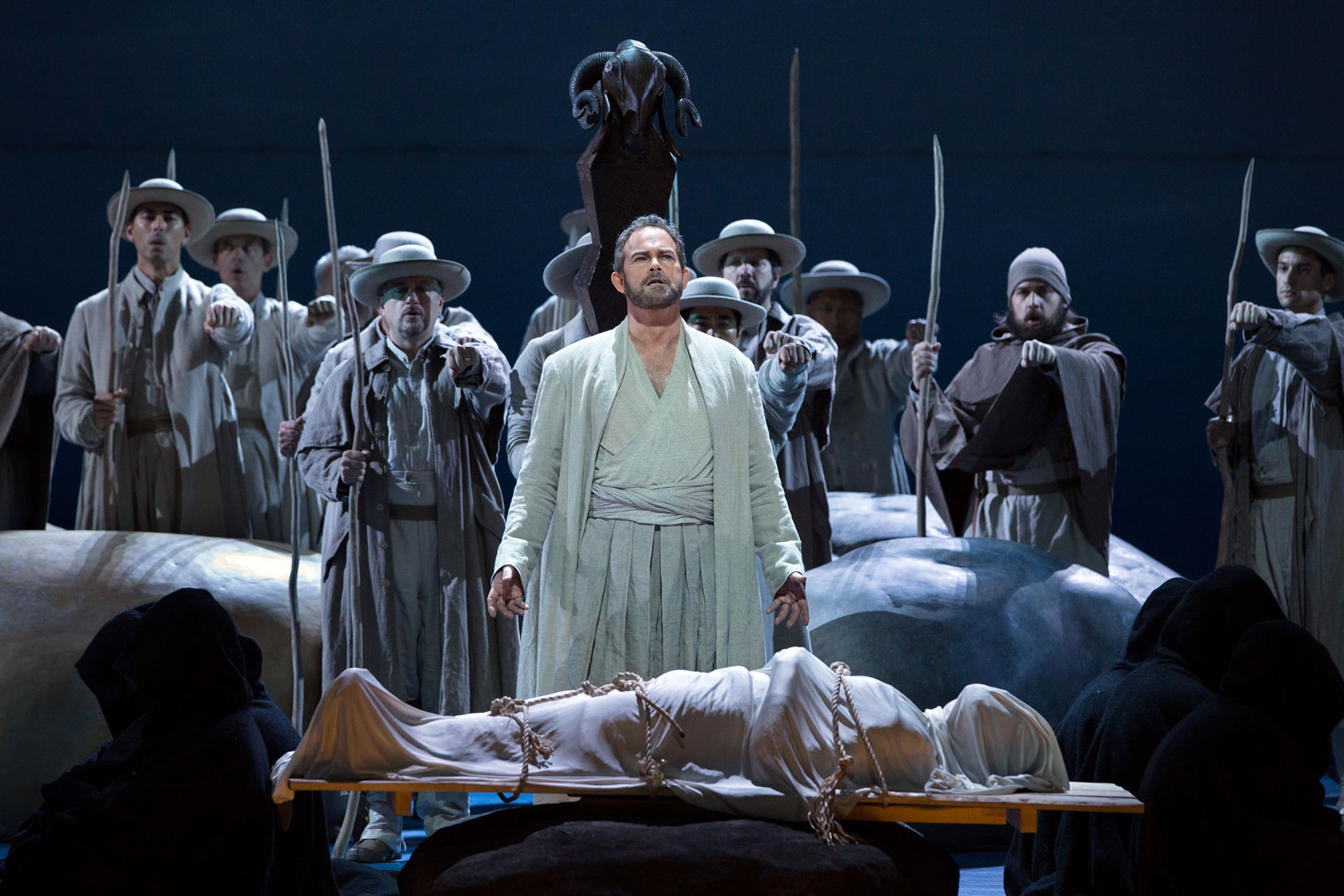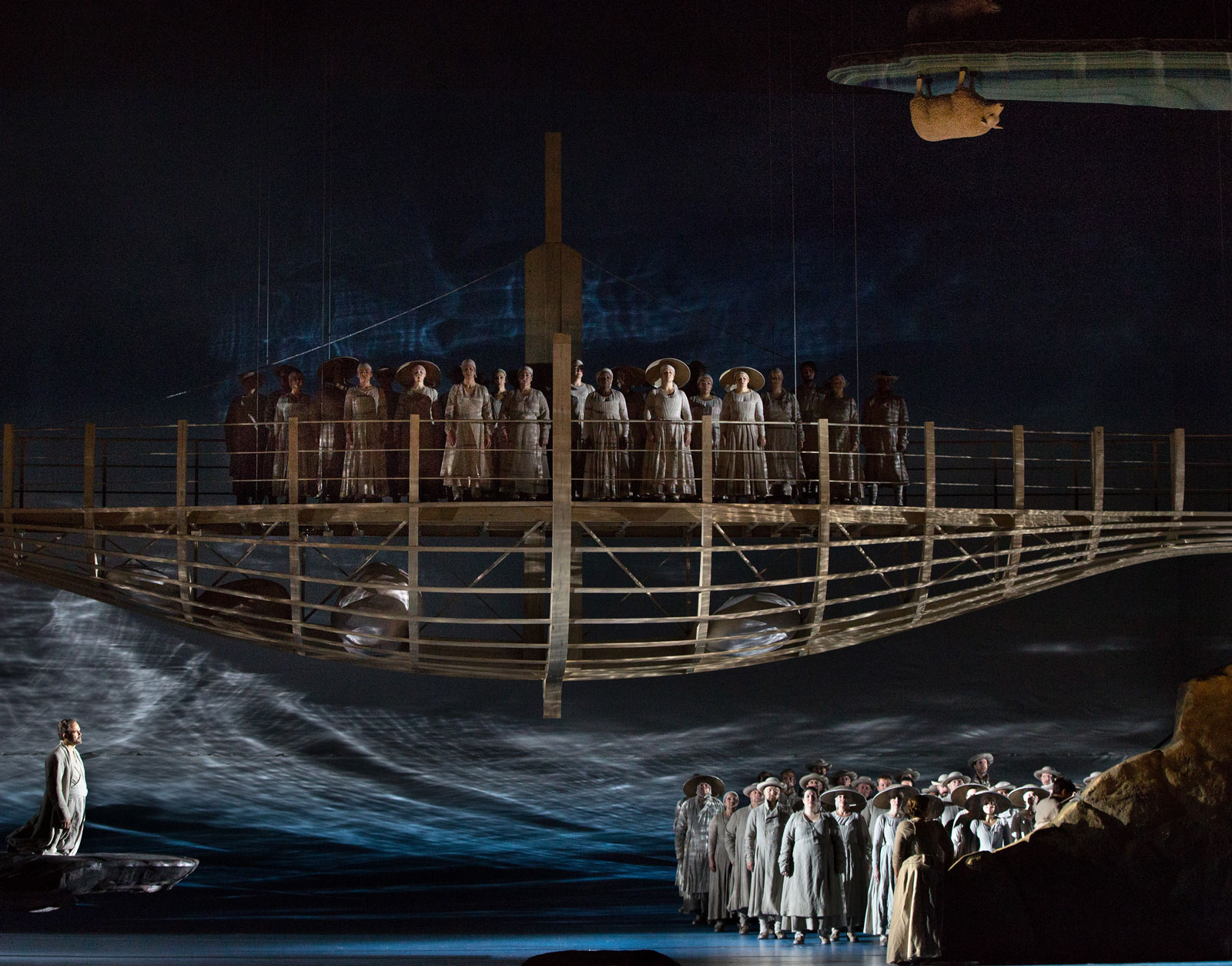Rossini’s Guillaume Tell—now being staged at the Metropolitan Opera for the first time since 1931, and for the first time ever there in its original French—is as powerful a piece of operatic machinery as Parisian opera had to offer in 1829. Its broad and spacious structure is animated by warm and full-bodied surges of feeling, and when set in motion this nearly five-hour work can still deliver a sustained experience of sensory and emotional overabundance. Here Rossini, having come to Paris five years earlier as the renowned thirty-one-year-old composer of thirty-three operas, created in what would be his last work for the stage a perfected fusion of the approaches available to him, by turns epic and delicate and charged with dramatic bravura.
As a French opera by an Italian composer based on a German play adapted from a Swiss legend, it is tempting to think of Guillaume Tell as a symptom of transnational yearning, with Swiss patriotism serving as the emblem of a wider union. William Tell is not much more historical a figure than Robin Hood, and so makes a perfect hero for an all-purpose celebration of liberty and solidarity with none of the ambivalences and mixed motives of actual politics. The story of the master archer Tell ordered to shoot an apple off his son’s head by the Austrian tyrant Gessler, was supposed to have transpired sometime in the early fourteenth century. A signal event of the Swiss national saga, it was already the stuff of children’s tales when Schiller wrote his play in 1805. Rossini’s French librettists—four of them in the end, churning out successive rewrites like screenwriters at Warner Brothers—streamlined Schiller’s chronicle-like structure to place Tell more decisively at the center of events, while concocting an appropriately conflicted love interest between the Swiss patriot Arnold Melchthal and the Austrian princess Mathilde. The result was a template for the political sublime: politics without messy political details and therefore without doubt or confusion, an ecstatic rallying point for sentiments like “independence or death” and “liberty, come down once more from the sky.”
It is a momentarily realized dream of national victory understood as synonymous with the triumph of liberty and of every form of domestic tenderness, a triumph synonymous in turn with the “pure air,” “radiant day,” and “boundless horizon” of the Swiss landscape when the mist finally lifts at the opera’s end. Rossini’s music becomes for all those things the ultimate metaphor, enacting every shade of exultation and liberty and radiance and boundlessness. The heroism of Tell’s compatriots in their struggle against the Austrian yoke finds its natural expression in jubilant singing, while the roles of Gessler and his soldiers reveal not tortured complexity but simple brute cruelty. Communal celebrations, protests, laments, vows of loyalty, and calls to arms are embodied in successive waves of choral singing, each seeming to attain the highest imaginable peak until the next advances further. The whole work functions as a massive act of encouragement, constructed to induce in the audience the sense of a brave and finally invulnerable collective spirit: “For us no more servile fear, /Let us be men, and we shall conquer!”
The opera is stirring in the most deliberate and efficient way, unified in theme, unambiguous in its narrative. It feels like a monolith, yet is never monotonous. The simplicity of the dramatic arc only emphasizes Rossini’s untiring search for one further variant or extension, one additional unlooked-for flourish. It hardly seems possible that one could continue to be surprised and yet he manages it, whether by abruptly suppressing the orchestra at a moment of supreme tension, so that Tell, singing to the son whose life he has been forced to put at risk, is accompanied chiefly by a tortuously winding cello line, or, at the opera’s end, by unleashing a choral whirlwind that surpasses in overwhelming sweep everything that has gone before, not a small achievement after the continual surges of choral music that have preceded it.
To listen to the Met’s current production is certainly to partake fully of Rossini’s abundance. The performance I saw (fortunately not the one later in the week that was cut short after a grieving man apparently threw his friend’s ashes into the orchestra pit, occasioning a police investigation of the mysterious powder) was an unbroken succession of vocal and orchestral pleasures, never losing the emotional thread that keeps this vast work together. Pierre Audi’s staging, first presented at the Dutch National Opera, was more intermittent in its pleasures. There were impressive moments of austerity and eloquent simplicity, but so much is going on that the impression is often of cluttered austerity or overbusy simplicity. (I am still working on the sheep and cow suspended upside down above the stage in Act I.)
Advertisement
Guillaume Tell is admittedly a work whose scale challenges even the capacious Met stage. The original stage directions, with their indications of lakes and fortresses and mountain ranges, evoke a degree of pageantry that might well call for full medieval regalia and a complement of live horses. Clearly Audi wants to lay down more abstract lines. We confront at the outset an expanse whose upper and lower halves mirror each other like sky and sea, while suspended above the stage is a great boatlike framework shaped like a crossbow. Through a scrim we discern bulbous rock-like shapes, which in the course of the opera will be moved around to represent various natural formations of lake or mountain. The wooden boat framework will serve at various points as a vaguely defined crosswalk or rampart from which characters can peer down at the action.
A major task in staging Guillaume Tell is dealing with the size and prominence of the chorus, separated out in the course of the evening into a variety of categories and subgroups. With all the shifting and circling about among the various clumps of landscaping, principal characters can get lost in the crowd. The complex maneuvers of the third act leave the oppressed peasants, brutal soldiers, and assorted ruling-class onlookers jostling for room as we approach the grand scene of Tell submitting to the tyrant Gessler’s order to shoot an apple off his son’s head.
At the Met, Gessler’s command center is represented by a circling of moveable wooden siege towers that provide the tyrant an upper platform from which to address the multitudes and, later in the act, a makeshift place of detention for Tell and his son. The starkness of the towers makes possible a conflation of medieval fortress and twentieth-century concentration camp, with the further anachronistic flavoring of having the collaborationist aristos attired in frock coats and top hats. Here as elsewhere Audi underscores visually the atrocities that the libretto only relates at second hand. In the first act the Austrian soldiers make their appearance at the peasant wedding long before the libretto indicates, creating a more sinister setting for the joyful music. At the end of that act a cartload of murdered rape victims is rolled out, the bodies dumped at the center of the stage. A coffin bearing the body of the assassinated patriot Melchthal is later carried onstage so that Arnold can address his grief directly to his father’s exposed corpse. The long ballet scene in the middle of the third act is staged as a session of collective torture, the Swiss captives forced to dance by leather-clad women wielding whips. The sense of oppression and menace in Gessler’s compound was amply and relentlessly evoked, but things got a bit squeezed, and there was a sense of considerable effort in clearing enough space to allow Tell to finally get off his miraculous shot—a neat enough effect, if so rapid as to be barely visible.
The music is so broad and clear in its lines of development that no muddiness of staging could get in its way. This is an occasion when the members of the Met chorus get to dominate, and they make the most of it. From the calm pastoral celebration that opens the opera through all vicissitudes of victimization and militant action, the chorus is the platform on which everything else rests. Tell and his fellow conspirators interact with the chorus as equals rather than commanders, and the drama within the community has to do with affirming bonds and alliances in an atmosphere of familial devotion. Gerald Finley was an ideal Tell in this regard, commanding respect but never domineering, vulnerable in his love for his wife and son but equally capable of sternly bringing the wavering Arnold into line. His compressed third act aria “Sois immobile”—in which he begs his son to remain motionless while he attempts to shoot the apple—brought all the uproar of the scene preceding it into a taut and tender moment of suspension, the whole massive contraption hanging by a thread.
Notable also were Bryan Hymel as Arnold and Marina Rebeka as Mathilde. The most politically unreliable characters get the most delicately transfixing stretches of music, as Arnold’s love for the Austrian princess causes him to waver for a time in his devotion to the cause of freedom, and she in turn urges him to find glory as a soldier of Austria. The literary content of what the lovers have to say to each other is quite banal, and their dilemma strictly generic, but musically they cohabit a world set apart, driven by surrender to desire rather than patriotic duty. Their evasion is glorified by the sheer lyric force of its expression, a force magnificently realized by Rebeka from the moment she makes her first appearance in the second act. After all the choral clamor of the first act, the tensile precision of her singing in the sinuous aria “Sombre forêt, désert triste et sauvage” marked out the boundaries of another space away from all that, isolated and melancholy but unwavering in its insistence on its own truth. Hymel grew steadily in strength throughout the evening, reaching a peak of mournful expressiveness in the opening of act four as he returns alone to his father’s abandoned home.
Advertisement
And then, when it is all over, when everyone has saved their honor, and the tyrant is killed and Switzerland is free, the skies clear to the sound of harp music, the lights come up on stage, and Tell declares in a passage of utmost simplicity: “Everything changes and enlarges in this place! /What pure air!” His hymn to liberty is echoed by a chorus that seems to draw on resources that have been kept in reserve, as if to reveal an unsuspected further layer of exaltation. This finale is not more than three minutes long but it as if, in these final moments of the opera, another extraordinary miniature opera had come to light, opening up possibilities not yet imaginable. Next stop, Valhalla.
Guillaume Tell is playing at the Metropolitan Opera on November 5, November 9, and November 12.



